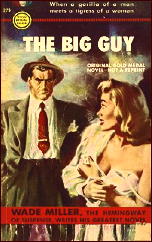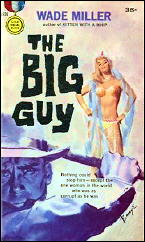Thu 10 Dec 2009
WADE MILLER – The Big Guy. Gold Medal #279, paperback original, 1st printing, January 1953; second printing: Gold Medal s936, 1969.

Wade Miller was the joint pseudonym of a couple of high school buddies who teamed up to write mysteries all their adult lives, with astonishingly successful results. Astonishingly, because their books were almost without exception flat, trite and predictable.
And their work under the pen-name Whit Masterson is even worse; reading Badge of Evil is an onerous chore indeed for anyone charmed by the grace and energy of the film Orson Welles managed to make from it (Touch of Evil, Universal,1958.)
I can speak from experience on the breadth and depth of Wade Miller’s ineptitude because I searched out those books avidly, back in college, after reading what turned out to their one decent effort, The Big Guy. What burst of inspiration was responsible for this I couldn’t say, but it’s fast, hard and even fun in a sick, predictable fashion. Like watching a really bad accident when you can’t look away.
Big Guy follows the rise and rise of Joe Drum, a low-class, no-brains strong-arm man imported to L.A. for a little muscle, who sees a chance to move into the big time and takes it. And keeps on taking.

Miller borrows a lot from films like Scarface, and Little Caesar, but the writing is fast, the violence edgy and often surprising, and the story gets really going, in its own disturbing way, about halfway through, when Drum meets a woman who cures his sexual hang-ups, introduces him to comfort, culture, class and drugs, and generally makes a better person out of him — with results you can see coming a long way off, but I kind of enjoyed watching it all happen.
Miller introduces a couple of subtle touches you don’t see in a Wade Miller book, and shows sense enough not to call attention to them —nothing’s worse than pointing out how subtle you’re being.
Back in College this really impressed me, as I say, and I followed it up, or tried to, with some other Millers, till I found I was squandering my precious youth on a writer (writers, rather) who had only one good book between them.
Editorial Comment: For much, much more on the authors who were Wade Miller, including loads of reviews and an interview with Robert Wade by Ed Lynskey, Bill Pronzini and myself, go here on the main Mystery*File website.
December 10th, 2009 at 10:01 pm
Dan, you’ve provided an excellent example of what works for one reader doesn’t work for another. I’ve read most (not all) of Wade Miller’s Gold Medal books, and most (not all) of his private eye Max Thursday series.
Some succeed more than others, but I found all of the ones I’ve read to be innovative, edgy (in the strongest noirish sense of the word) and entertaining.
THE BIG GUY, unfortunately, is one of the Gold Medal’s I haven’t read, or at least I don’t remember it, and I’ll have to dig my copy out right away.
On the other hand, you may be right about the Whit Masterson books. I haven’t found one that intrigued me enough from the blurbs on the cover to read it, not even BADGE OF EVIL.
— Steve
December 10th, 2009 at 10:29 pm
Dan
I have to say I’m with Steve on these. I consider the Max Thursday books one of the high points of their era and while the other books may vary I am a fan of both the Miller and Masterson books.
Steve
Of the Masterson books, they tend to be suspense novels and a bit slicker than the Miller novels, the best for my money are Badge of Evil (despite what Orson Welles said about it), 711 Officer Needs Help (a fairly good movie with David Jansen as Warning Shot), The Death of Me Yet, The Man on the Nylon String, and All Through the Night.
But like you I missed The Big Guy.
Still, this really looks like a case of what makes horse races.
December 10th, 2009 at 11:51 pm
I like the novels of Wade Miller also. I was going to write an essay about what I do when I stumble across an author that just about everyone else likes but that I hate, but I’d rather spend the next couple hours watching a film noir or mystery movie or reading a book.
However I will relate one funny thing that happened recently, at least I think it’s funny. On the rava-avis yahoo group, many members were mentioning their favorite Wade Miller novels, etc. I was happily reading the comments as they appeared which mainly consisted of “I like this Wade Miller novel” or “no I like this one”. I don’t recall any negative comments to speak of.
Then something happened that killed the discussion dead. It was simply Steve Lewis casually mentioning that if readers wanted to know more, much more about Wade Miller then here is a link, and he posted the same link as at the bottom of the above review.
When I first read the comment I nearly fell out my chair laughing because I knew what the result would be. No. More. Discussion. Why? Because it’s a link to a great comprehensive discussion about Wade Miller and the novels. After reading the Mystery*File website there is nothing else to discuss, at least nothing to discuss along the lines of “I like this novel or that novel”.
Well, at least I thought it was funny. Of course probably no one else saw any humor in it. Which just goes to show you here I think it’s humorous and no one else does!
December 11th, 2009 at 12:14 am
Thanks, Walker. You made my day!
— Steve
December 11th, 2009 at 12:16 am
Walker
Nothing kills a good literary discussion faster than someone entering the argument who knows whereof they speak.
December 13th, 2009 at 12:59 pm
To each his own. Having read all the Max Thursday books and a number of Miller’s others I’ve yet to be disappointed by one. When coming across a previously unexplored used bookstore, the first thing I do is look for Wade Miller novels. I haven’t read any Whit Masterson novels yet. Maybe they’re lesser efforts.
December 13th, 2009 at 4:55 pm
The Masterson books aren’t lesser, but the emphasis is different. The Miller books are noirish and hard boiled. The Masterson books are slick suspense novels wholly different in style and approach. The Miller books, other than the Thursdays, were written for the paperback market. I think all the Masterson books appeared in hardcover — and true to the times are slicker for that.
But they are good competent suspense novels for the most part, and if they lack the noirsh elements of the Miller books they have their own pleasures.